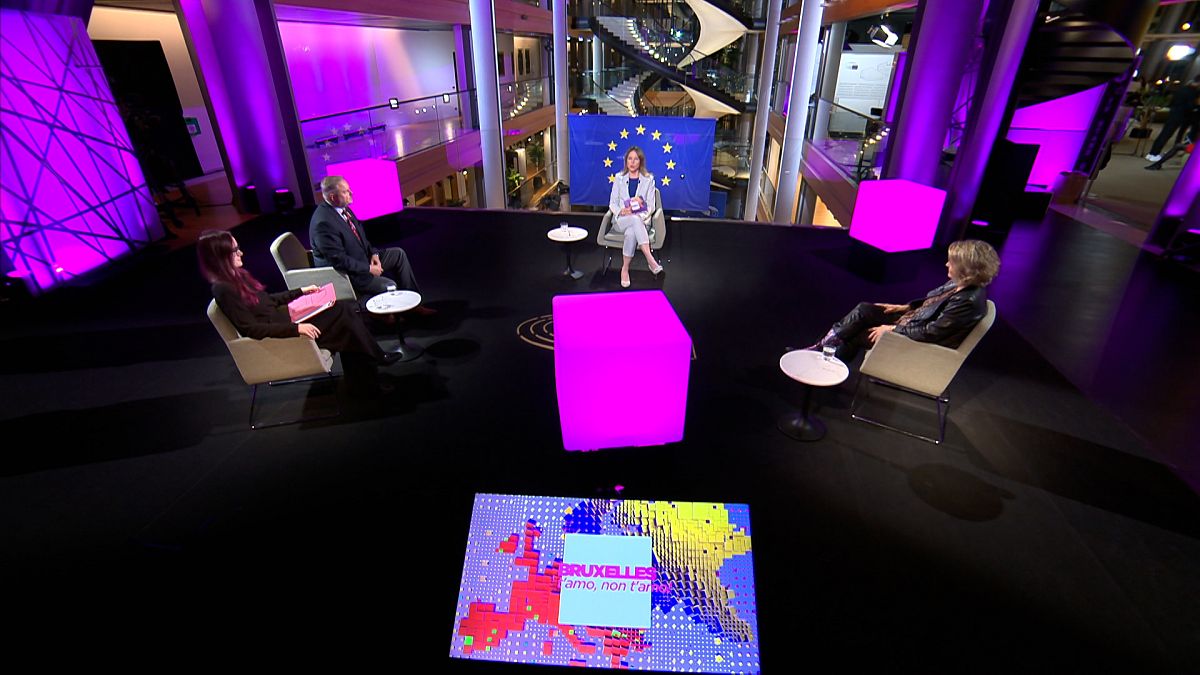Europe
Brussels, my love? Can the EU counter Putin’s sinister shadow war?

Introduction: Understanding the Challenges Facing the West
In this edition of "Brussels, my love?", we delve into the pressing issues confronting the West, including Russia’s covert efforts to destabilize Western democracies and the urgent need for investment in artificial intelligence (AI). The program, broadcast from the European Parliament in Strasbourg, features a panel of European lawmakers discussing these critical topics. The Chair of the Ukrainian Parliament, Ruslan Stefanchuk, made a surprise visit to emphasize Ukraine’s dire need for military support, including defense systems and aircraft, to withstand Russian aggression. Meanwhile, the discussion also reflected on the one-year anniversary of the death of Russian opposition leader Alexei Navalny, highlighting the ongoing struggles for democracy and freedom in Russia. This edition serves as a reminder of the interconnected challenges facing the West, from geopolitical threats to technological advancements.
Putin’s Shadow War Against the West
The panel of MEPs—Markéta Gregorova of the Czech Pirate Party, Riho Terras of the European People’s Party, and Stine Bosse of Renew Europe—explored a lesser-discussed aspect of Russian aggression: Putin’s shadow war. Unlike traditional warfare, this strategy involves covert operations designed to destabilize Western democracies and erode their way of life. Riho Terras ominously noted that in Russia, "you open the window and you fall out of it," referencing the countless individuals who have lost their lives for opposing the regime, with Navalny being a prominent example. This shadow war is a testament to Putin’s relentless efforts to undermine Western values and institutions, using tactics that are more subtle but no less dangerous than conventional warfare.
The Rise of Fascism and the Erosion of Democracy
Markéta Gregorova sounded the alarm on the resurgence of fascism, warning that the world is experiencing a period reminiscent of 1930s Germany. She emphasized that the rise of authoritarianism and nationalism is not merely a distant memory but a present-day reality. The panel underscored the importance of vigilance in defending democratic principles, especially in the face of external threats like Putin’s shadow war. The discussion served as a stark reminder that democracy is fragile and requires constant protection. The anniversary of Navalny’s death also highlighted the personal costs of resistance and the need for the international community to stand in solidarity with those fighting for freedom.
The Anniversary of Alexei Navalny’s Death: A Reminder of Russia’s Oppression
The program reflected on the one-year anniversary of Alexei Navalny’s death, a poignant reminder of the human cost of opposing the Putin regime. Navalny, a vocal critic of Putin, was a symbol of resistance against authoritarianism, and his death sent shockwaves around the world. The panel honored his legacy and underscored the ongoing struggles for democracy in Russia. Riho Terras highlighted the broader context of repression in Russia, noting that Navalny’s case is just one example of the many lives lost under Putin’s rule. The anniversary serves as a call to action for the international community to continue supporting those who courageously oppose tyranny.
The Double-Edged Sword of Artificial Intelligence
The panel also turned its attention to the opportunities and challenges posed by AI, a technology that promises significant benefits but also carries substantial risks. While acknowledging that the EU may be "a bit late" to the AI race, Stine Bosse argued that this could be an advantage, allowing Europe to learn from the mistakes of others and develop more robust frameworks for ethical AI. Markéta Gregorova suggested looking to China’s Deepseek as a model, urging the EU to adapt and innovate while ensuring that AI development aligns with democratic values. The panel agreed that the benefits of AI outweigh the risks, but only if the technology is harnessed responsibly and with a commitment to transparency and accountability.
Conclusion: A Call to Action for the West
In conclusion, this edition of "Brussels, my love?" serves as a stark reminder of the multifaceted challenges facing the West. From Putin’s shadow war to the rise of fascism and the complexities of AI, the panel emphasized the need for vigilance, cooperation, and innovation. The visit from Ruslan Stefanchuk underscored Ukraine’s urgent need for military support, while the anniversary of Navalny’s death highlighted the human cost of resistance. The discussion on AI reinforced the importance of leveraging technology to enhance, rather than undermine, democratic values. As the West navigates these challenging times, the message is clear: unity, resilience, and a commitment to freedom are more important than ever. Watch the full discussion in the player above for deeper insights into these pressing issues.